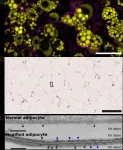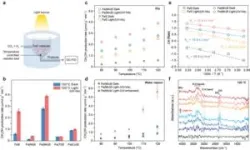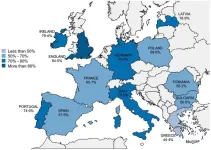(Press-News.org)
A team at the Centro Nacional de Investigaciones Cardiovasculares (CNIC), led by Professor Miguel Ángel del Pozo Barriuso, who heads the Mechanoadaptation and Caveolae Biology group at the CNIC, has identified an essential mechanism in fat cells (adipocytes) that enables them to enlarge safely to store energy. This process avoids tissue damage and protects the body from the toxic effects of accumulating fat molecules (lipids) in inappropriate places. The results, published in Nature Communications, signify a major advance in the understanding of metabolic diseases. Moreover, this discovery opens the door to the development of new therapeutic strategies to combat diseases related to chronic energetic excess, such as overweight, obesity, lipodystrophy, and metabolic syndrome, and their grave cardiovascular and metabolic complications.
In modern societies, characterized by sedentary lifestyles and high-calorie diets, adipose tissue is a key determinant of metabolic health. Adipocytes can enlarge to store energy in the form of fat, preventing excess lipids from accumulating in organs like the liver or in the blood vessel wall (especially in the heart and the brain), where they could cause irreparable damage.
Nevertheless, this process is not risk free. When adipocytes are overloaded with fat they can rupture, releasing their toxic contents and generating inflammation and metabolic alterations.
The CNIC study examined how adipocytes adapt to withstand the mechanical stress associated with their expansion to accommodate an excess of fat.
The team analyzed the role of caveolae, small invaginations in the cell membrane that act as sensors and shock absorbers of these stresses. “When an adipocyte accumulates fat and its surface is under increased tensile stress, the caveolae flatten, releasing a ‘reservoir’ of membrane that allows the cell to enlarge without breaking apart. Conversely, when fat reserves diminish, these structures regroup to reduce the excess membrane and restore cellular stability,” explained study first author Dr. María Aboy Pardal.
Caveolae: not just a structural support
As well as physically protecting adipocytes, caveolae also play an essential role in coordinating cell metabolism. Miguel Ángel del Pozo Barriuso explained that during adipocyte expansion, “molecular components of these membrane structures travel to other cell compartments, conveying signals that adjust metabolic activity to match the level of energy reserves. This capacity for internal communication makes caveolae key elements for efficient caveolar function.”
However, when these structures are absent or malfunction, adipocytes become more rigid, vulnerable to rupture, and less efficient at storing energy. The result, added Aboy Pardal, “is an inflammatory reaction that compromises the body’s metabolic health. This phenomenon is linked to conditions such as lipodystrophy, in which the body cannot store fat, leading to severe metabolic and cardiovascular alterations.”
The CNIC study highlights the key role of the caveolae protein caveolin-1 (Cav-1). For caveolae to flatten correctly in response to fluctuations in mechanical tension in the cell membrane, Cav-1 needs to be chemically altered by the addition of a phosphoryl group to a specific amino acid, a process called phosphorylation. For the study, the researchers developed a transgenic mouse that expresses a genetically altered version of Cav-1 that cannot be phosphorylated. This renders adipocytes unable to expand correctly in response to the mechanical tension generated by the accumulation of lipids (see figure), severely limiting their capacity to store energy and maintain cellular integrity. The failure of this simple mechanism ultimately leads to lipodystrophy and its severe consequences.
Del Pozo Barriuso concluded that “these results give us a better understanding of how adipose tissue responds to the mechanical forces associated with energetic excess. In the context of obesity and metabolic syndrome, this protective mechanism is essential for minimizing organismal damage.”
The study was conducted with the participation of the Transgenesis, Pluripotent Cell Technology, Micrcoscopy, and Histopathology units at the CNIC. The CNIC team also partnered with investigators from the Instituto de Ciencia de Materiales de Madrid (ICMM, CSIC), the Centro de Investigación en Medicina Molecular y Enfermedades Crónicas (CIMUS), the Centro Nacional de Investigaciones Oncológicas (CNIO), the Instituto de Investigaciones Biomédicas 'Sols-Morreale', and the Centro de Investigaciones Biológicas Margarita Salas–CSIC.
About the CNIC
The CNIC is an affiliate center of the Carlos III Health Institute (ISCIII), an executive agency of the Spanish Ministry of Science, Innovation, and Universities. Directed by Dr. Valentín Fuster, the CNIC is dedicated to cardiovascular research and the translation of the knowledge gained into real benefits for patients. The CNIC has been recognized by the Spanish government as a Severo Ochoa center of excellence (award CEX2020-001041-S, funded by MICIN/AEI/10.13039/501100011033). The center is financed through a pioneering public-private partnership between the government (through the ISCIII) and the Pro-CNIC Foundation, which brings together 11 of the most important Spanish private companies.
END
The increased use of a chemical compound to replace TNT in explosive devices has a damaging and long lasting effect on plants, new research has shown.
In recent years, TNT has started to be replaced with DNAN, but until now very little was known about how this substance impacts the environment and how long it can remain in the soil.
Researchers at the University of York have been studying the environmental impact of the explosive, TNT, for more than a decade. They have shown that the chemical compound, which is used by the military around the world, remains in ...
An international team of scientists recently published a study highlighting the potential role of iron sulfides in the formation of life in early Earth’s terrestrial hot springs. According to the researchers, the sulfides may have catalyzed the reduction of gaseous carbon dioxide into prebiotic organic molecules via nonenzymatic pathways.
This work, which appeared in Nature Communications, offers new insights into Earth’s early carbon cycles and prebiotic chemical reactions, underscoring the significance of iron sulfides in supporting the terrestrial hot ...
New research from Karolinska Institutet shows that long-term sex hormone treatment in transgender individuals can lead to significant changes in body composition and risk factors for cardiovascular disease, particularly in transgender men. The study is published in the Journal of Internal Medicine.
“We saw that transgender men treated with testosterone increased their muscle volume by an average of 21 percent over six years, but also that the amount of abdominal fat increased by 70 percent,” says Tommy Lundberg, docent at the Department of Laboratory Medicine, Karolinska Institutet. “In addition, they had more liver ...
Seven out of ten homes in Europe are smoke-free, according to a major survey published today (Thursday) in ERJ Open Research [1]. However, some countries have come further than others in protecting children and adults from second-hand tobacco smoke in the home.
Greece came out bottom of the 12 countries in the survey, with smoking allowed in more than half of homes. In Romania, Bulgaria and Spain more than four in ten homes allow smoking to take place. England scored the highest out of the 12, with more than eight in ten homes smoke-free, with Ireland, Latvia and Italy following next.
The researchers say that the ...
An injection given during some asthma and COPD attacks is more effective than the current treatment of steroid tablets, reducing the need for further treatment by 30%.
The findings, published today in The Lancet Respiratory Medicine, could be “game-changing” for millions of people with asthma and COPD around the world, scientists say.
Asthma attacks and COPD flare-ups (also called exacerbations) can be deadly. Every day in the UK four people with asthma and 85 people with COPD will tragically die. Both conditions are also very common, in the UK someone has an asthma attack every ...
Certain hormone replacement therapy (HRT) tablets containing both oestrogen and progestogen are associated with a higher risk of heart disease and rare but serious blood clots known as venous thromboembolism (VTE) in women around the age of menopause, finds a study from Sweden published by The BMJ today.
Another HRT tablet called tibolone was associated with an increased risk of heart disease, heart attack and stroke, but not blood clots, “highlighting the diverse effects of different hormone combinations and administration methods on the risk of cardiovascular disease,” say the researchers.
HRT is used to relieve menopausal ...
Cognitive behavioural therapy (CBT) and a programme of physical and mental rehabilitation probably improve symptoms of long covid, but the effects are modest, finds a review of the latest evidence published by The BMJ today.
Intermittent aerobic exercise also probably improves physical function compared with continuous aerobic exercise. But the researchers found no compelling evidence to support the effectiveness of other interventions, including certain drugs, dietary supplements, inspiratory muscle training, transcranial ...
An investigation published by The BMJ today reveals the extent of fossil fuel industry involvement in medical research, leading to fresh calls for academics and publishing companies to cut ties with companies.
An analysis by journalists Hristio Boytchev, Natalie Widmann and Simon Wörpel found that over the past six years, more than 180 medical articles have acknowledged fossil fuel industry funding, and an additional 1000 articles feature authors who worked for a fossil fuel company or related organisation.
While many studies don’t have an obvious link with fossil fuel industry interests, experts told The BMJ that publishing research ...
Researchers at Uppsala University have analysed the effects of seven different hormone treatments for menopausal symptoms on the risk of blood clots, stroke and heart attack. The study, which involved around one million women aged between 50 and 58, shows that the risks differ depending on the active substance and how the medicine is taken. Published in the scientific journal BMJ, this is the largest and most comprehensive study of currently prescribed hormonal substances in the world.
“There is concern among women that menopausal hormone therapy increases the risk of cardiovascular disease. This concern is based on older studies conducted more than ...
Patients with relapsed or refractory CD19-positive B-cell acute lymphoblastic leukemia (ALL) who were treated with the novel anti-CD19 chimeric antigen receptor (CAR) T cell therapy, obecabtagene autoleucel (obe-cel), experienced high response rates and most did not need a subsequent stem cell transplant (SCT), according to results from the Phase Ib/II FELIX trial co-led by researchers at The University of Texas MD Anderson Cancer Center.
The findings, published today in the New England Journal of Medicine, ...





